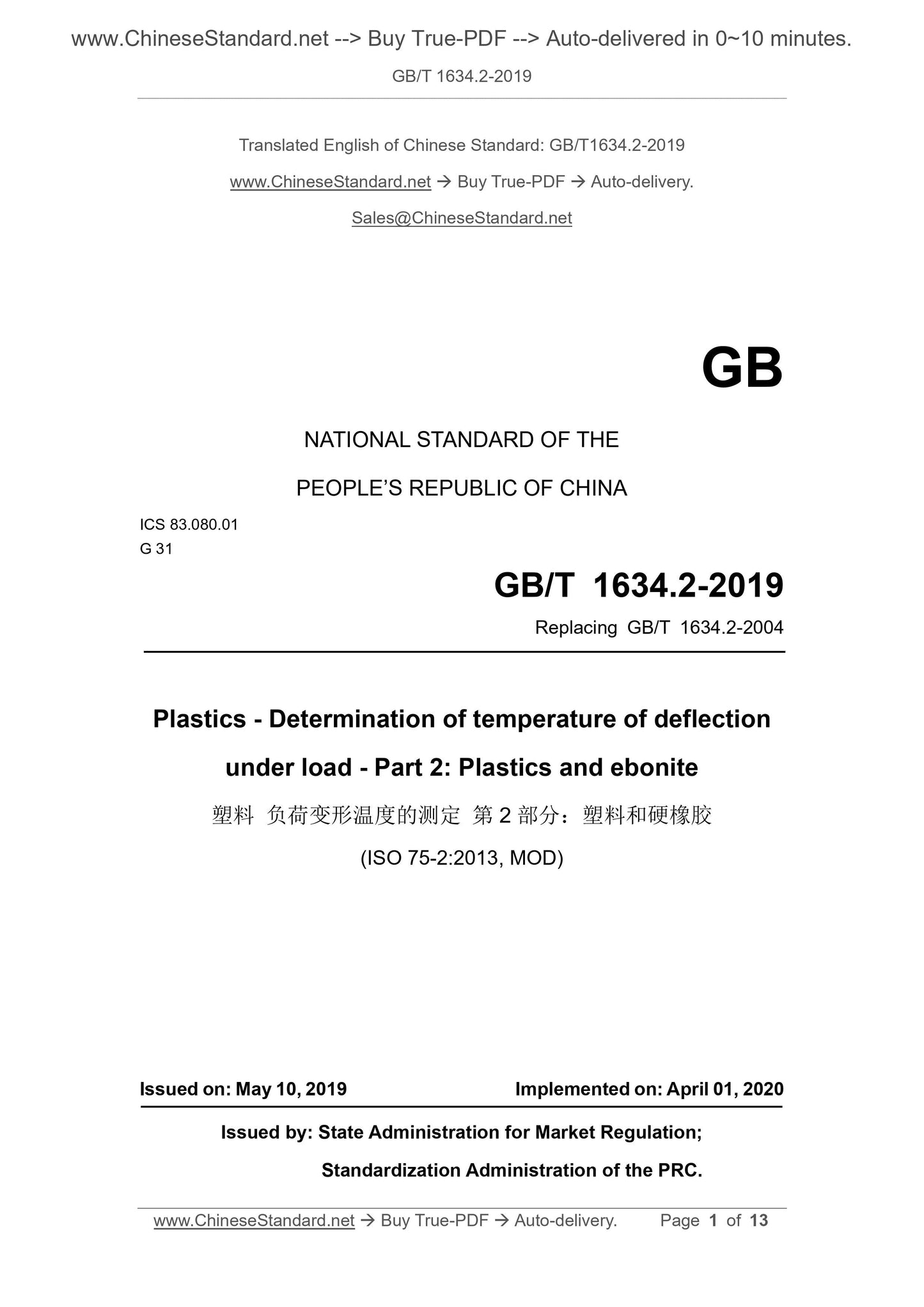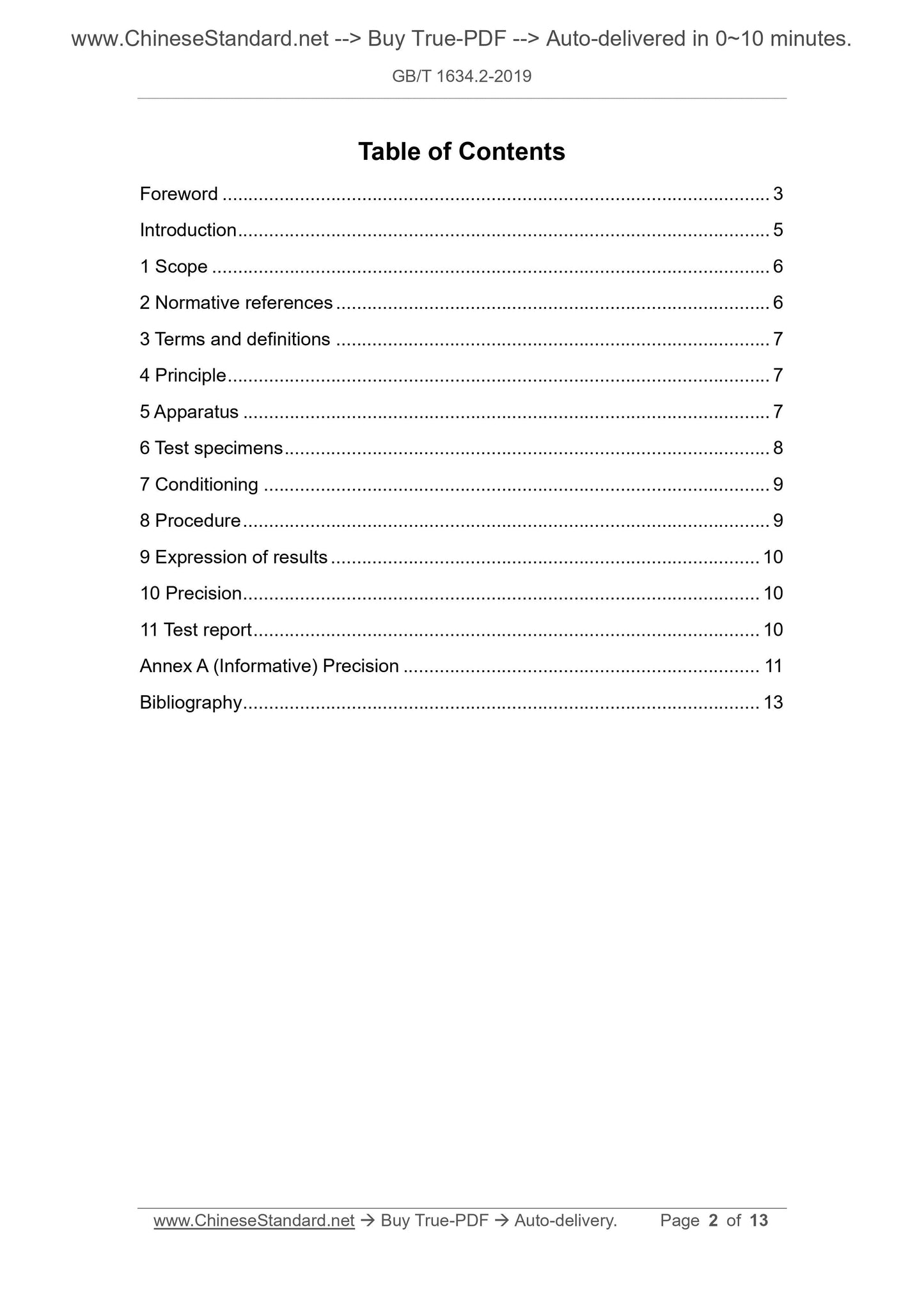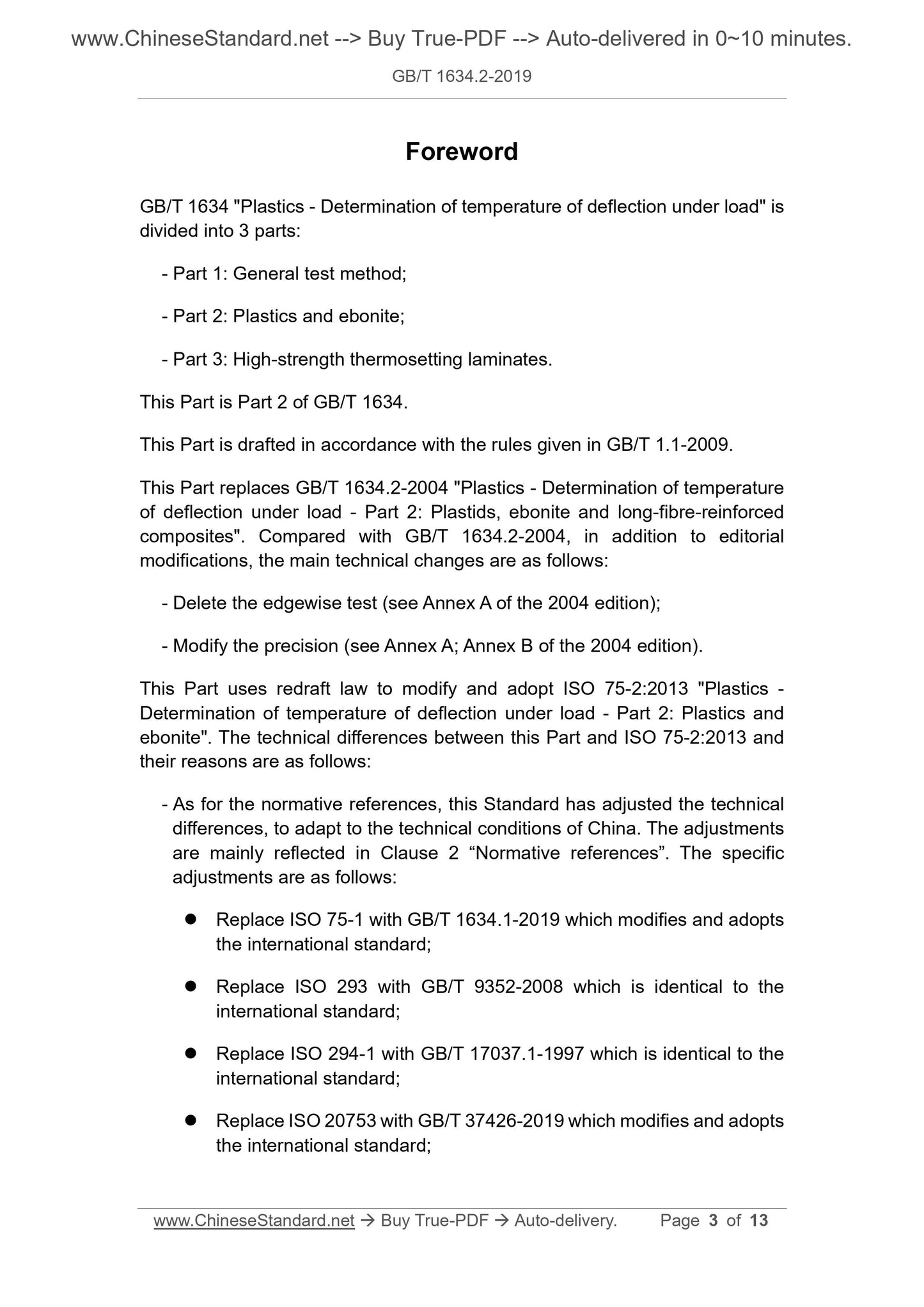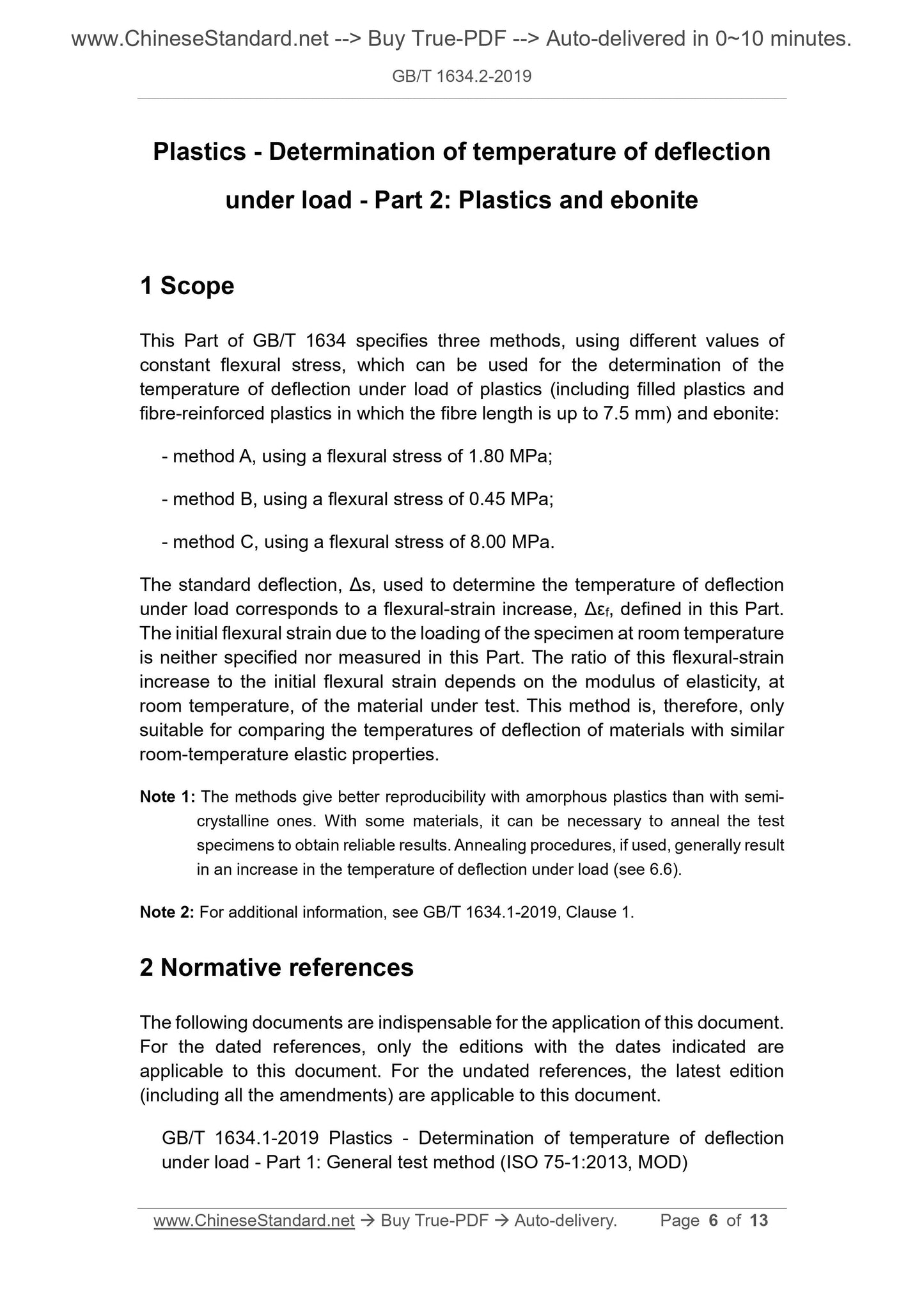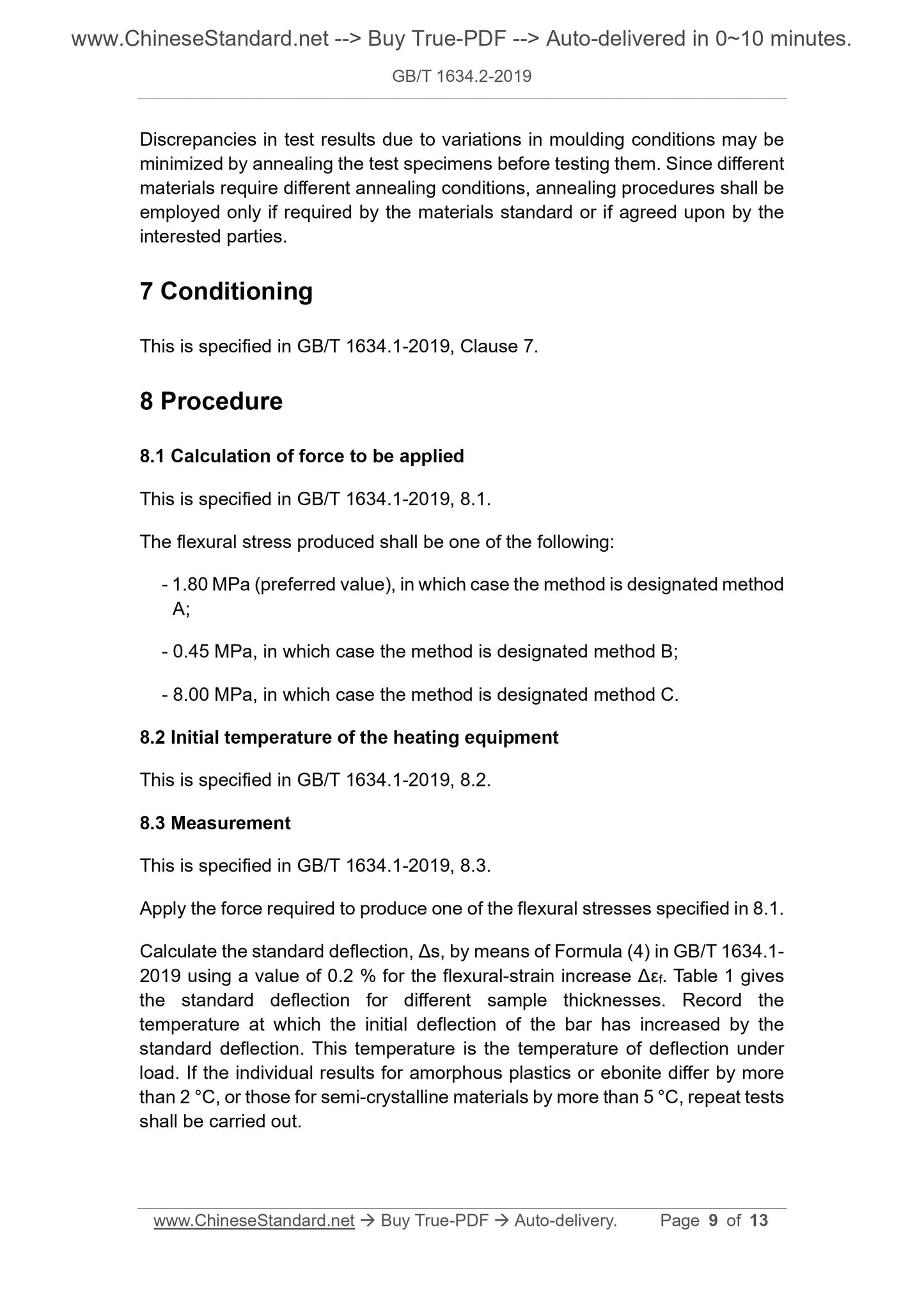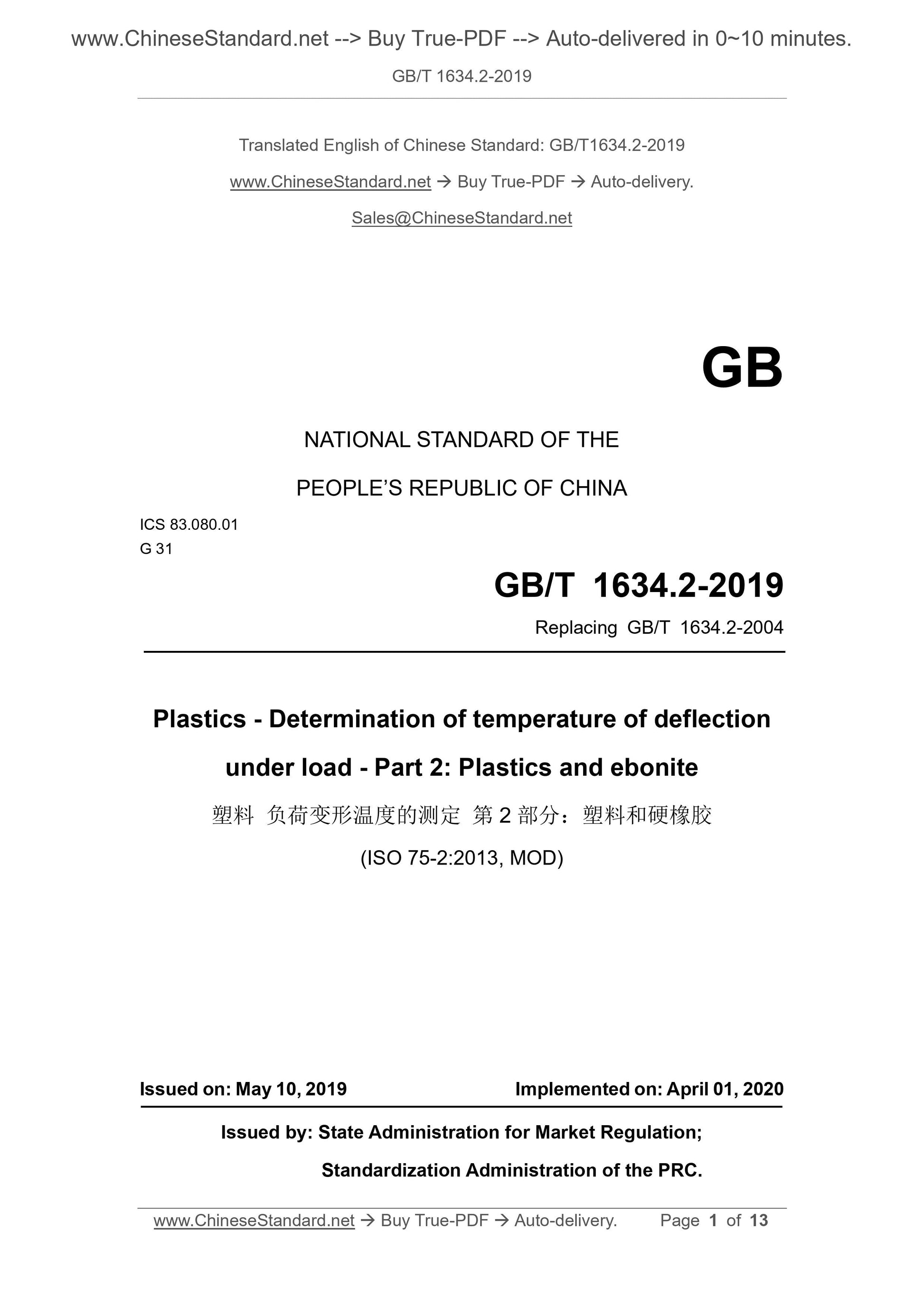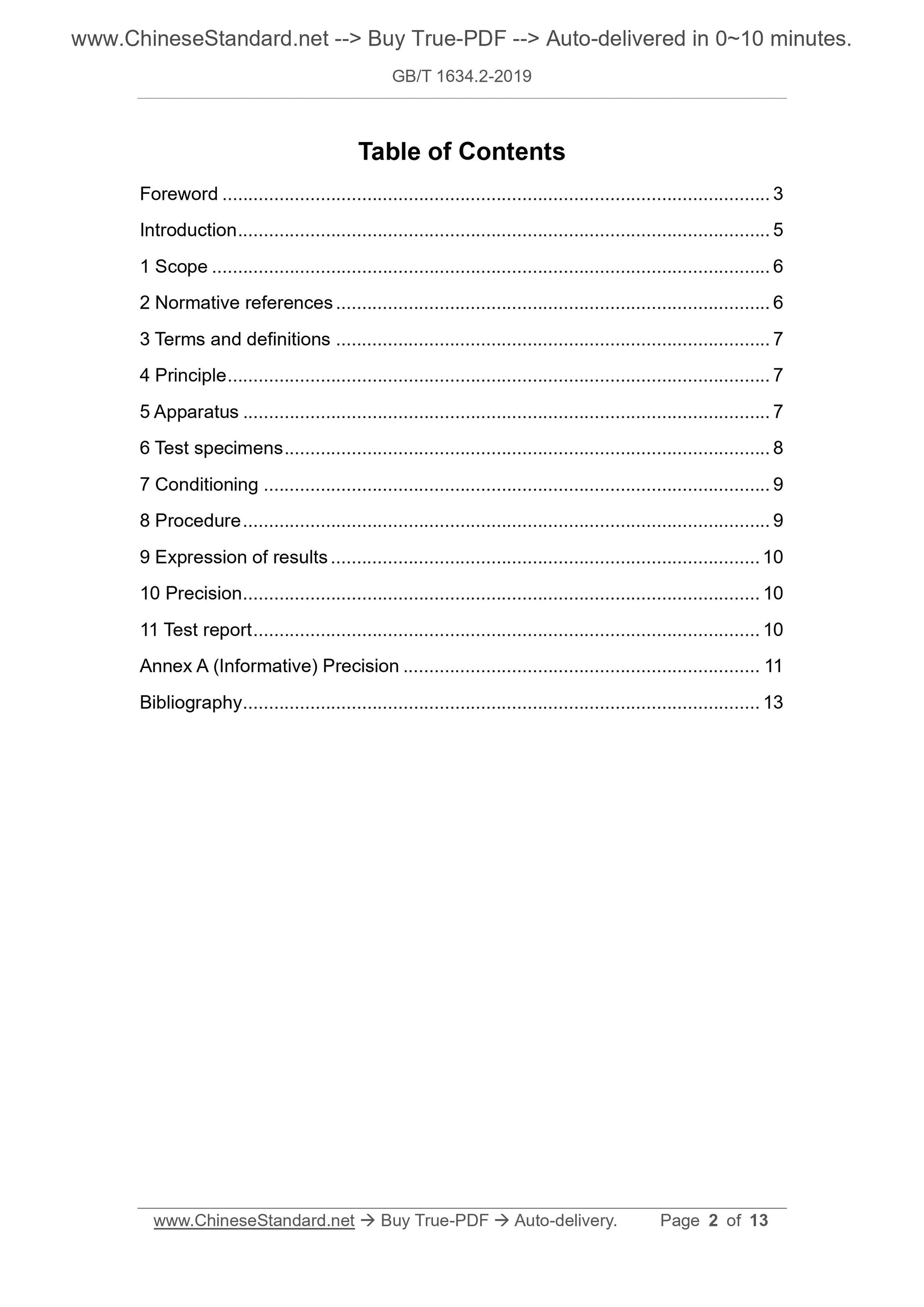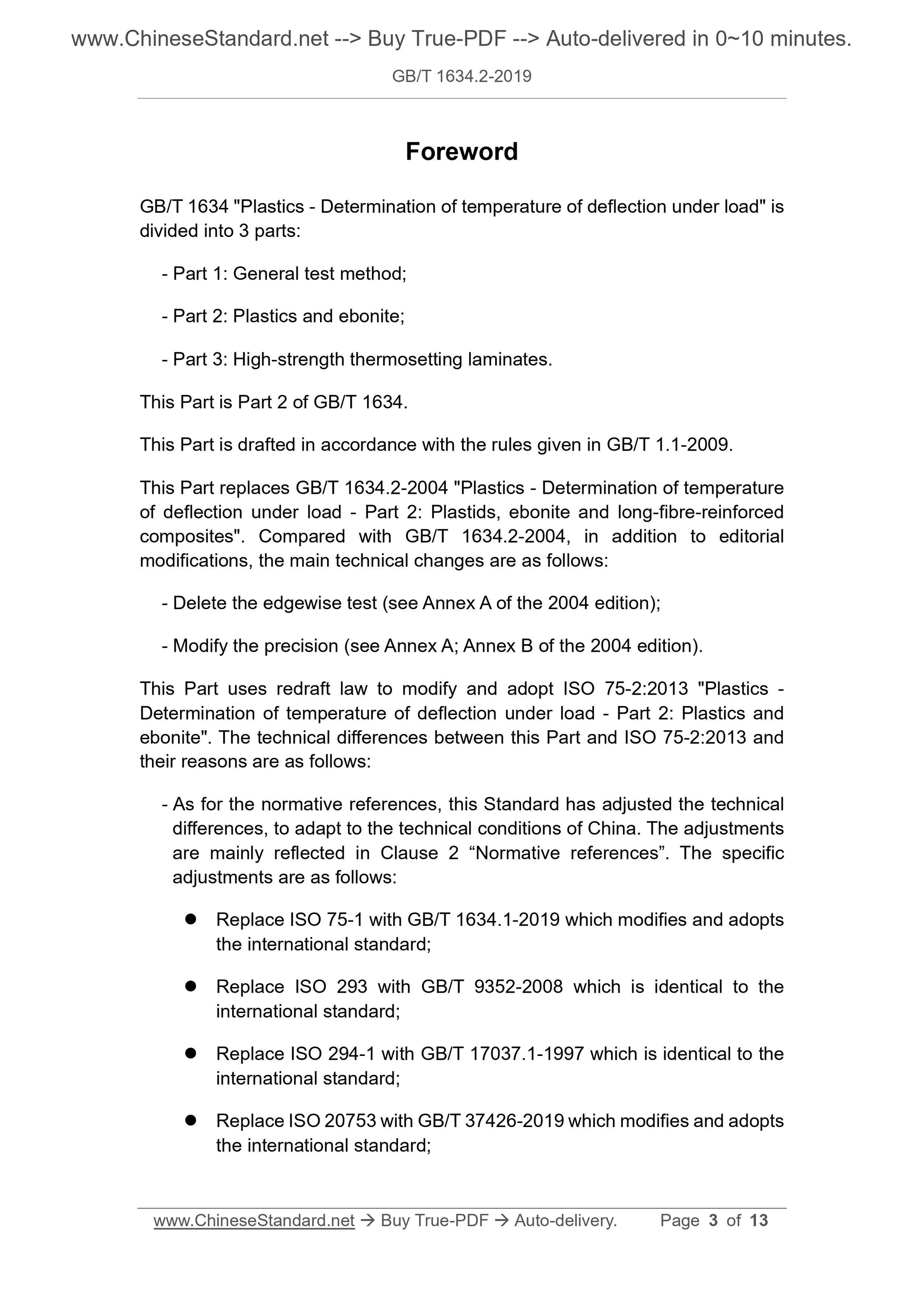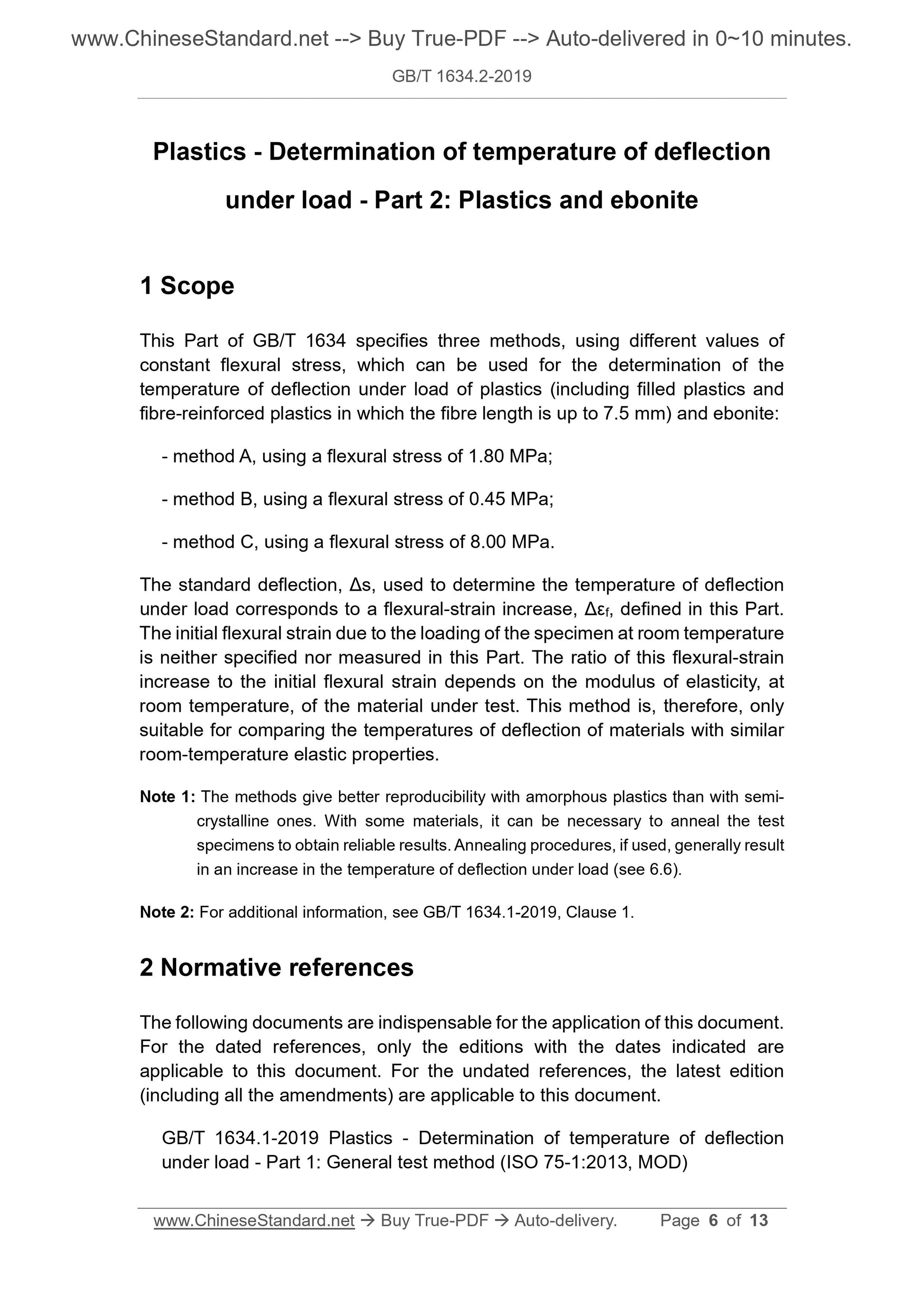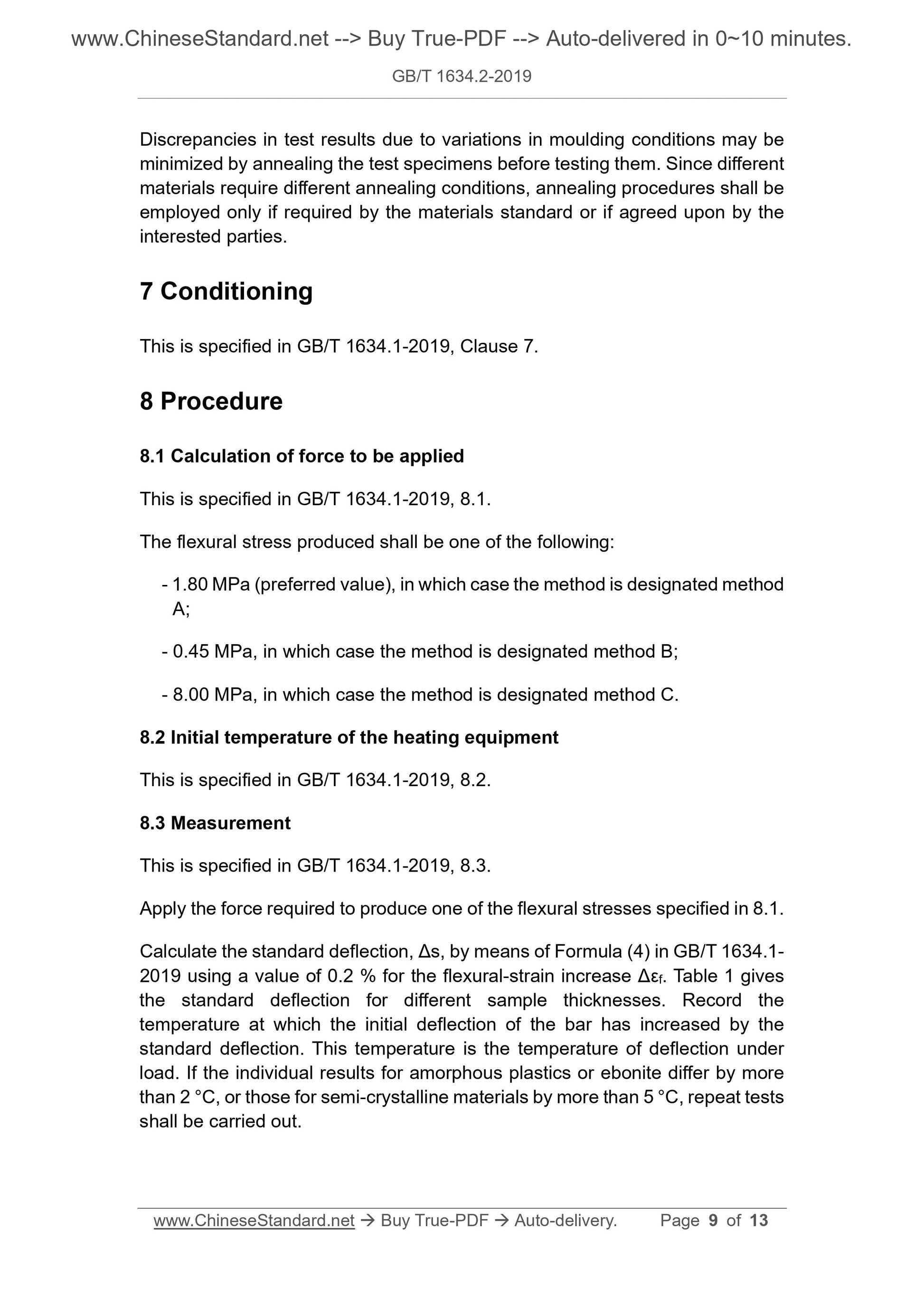1
/
of
5
www.ChineseStandard.us -- Field Test Asia Pte. Ltd.
GB/T 1634.2-2019 English PDF (GB/T1634.2-2019)
GB/T 1634.2-2019 English PDF (GB/T1634.2-2019)
Regular price
$135.00
Regular price
Sale price
$135.00
Unit price
/
per
Shipping calculated at checkout.
Couldn't load pickup availability
GB/T 1634.2-2019: Plastics -- Determination of temperature of deflection under load -- Part 2: Plastics and ebonite
Delivery: 9 seconds. Download (& Email) true-PDF + Invoice.
Get Quotation: Click GB/T 1634.2-2019 (Self-service in 1-minute)
Historical versions (Master-website): GB/T 1634.2-2019
Preview True-PDF (Reload/Scroll-down if blank)
GB/T 1634.2-2019
NATIONAL STANDARD OF THE
PEOPLE’S REPUBLIC OF CHINA
ICS 83.080.01
G 31
Replacing GB/T 1634.2-2004
Plastics - Determination of temperature of deflection
under load - Part 2: Plastics and ebonite
(ISO 75-2:2013, MOD)
ISSUED ON: MAY 10, 2019
IMPLEMENTED ON: APRIL 01, 2020
Issued by: State Administration for Market Regulation;
Standardization Administration of the PRC.
Table of Contents
Foreword ... 3
Introduction ... 5
1 Scope ... 6
2 Normative references ... 6
3 Terms and definitions ... 7
4 Principle ... 7
5 Apparatus ... 7
6 Test specimens ... 8
7 Conditioning ... 9
8 Procedure ... 9
9 Expression of results ... 10
10 Precision ... 10
11 Test report ... 10
Annex A (Informative) Precision ... 11
Bibliography ... 13
Foreword
GB/T 1634 "Plastics - Determination of temperature of deflection under load" is
divided into 3 parts:
- Part 1: General test method;
- Part 2: Plastics and ebonite;
- Part 3: High-strength thermosetting laminates.
This Part is Part 2 of GB/T 1634.
This Part is drafted in accordance with the rules given in GB/T 1.1-2009.
This Part replaces GB/T 1634.2-2004 "Plastics - Determination of temperature
of deflection under load - Part 2: Plastids, ebonite and long-fibre-reinforced
composites". Compared with GB/T 1634.2-2004, in addition to editorial
modifications, the main technical changes are as follows:
- Delete the edgewise test (see Annex A of the 2004 edition);
- Modify the precision (see Annex A; Annex B of the 2004 edition).
This Part uses redraft law to modify and adopt ISO 75-2:2013 "Plastics -
Determination of temperature of deflection under load - Part 2: Plastics and
ebonite". The technical differences between this Part and ISO 75-2:2013 and
their reasons are as follows:
- As for the normative references, this Standard has adjusted the technical
differences, to adapt to the technical conditions of China. The adjustments
are mainly reflected in Clause 2 “Normative references”. The specific
adjustments are as follows:
Replace ISO 75-1 with GB/T 1634.1-2019 which modifies and adopts
the international standard;
Replace ISO 293 with GB/T 9352-2008 which is identical to the
international standard;
Replace ISO 294-1 with GB/T 17037.1-1997 which is identical to the
international standard;
Replace ISO 20753 with GB/T 37426-2019 which modifies and adopts
the international standard;
Plastics - Determination of temperature of deflection
under load - Part 2: Plastics and ebonite
1 Scope
This Part of GB/T 1634 specifies three methods, using different values of
constant flexural stress, which can be used for the determination of the
temperature of deflection under load of plastics (including filled plastics and
fibre-reinforced plastics in which the fibre length is up to 7.5 mm) and ebonite:
- method A, using a flexural stress of 1.80 MPa;
- method B, using a flexural stress of 0.45 MPa;
- method C, using a flexural stress of 8.00 MPa.
The standard deflection, Δs, used to determine the temperature of deflection
under load corresponds to a flexural-strain increase, Δεf, defined in this Part.
The initial flexural strain due to the loading of the specimen at room temperature
is neither specified nor measured in this Part. The ratio of this flexural-strain
increase to the initial flexural strain depends on the modulus of elasticity, at
room temperature, of the material under test. This method is, therefore, only
suitable for comparing the temperatures of deflection of materials with similar
room-temperature elastic properties.
Note 1: The methods give better reproducibility with amorphous plastics than with semi-
crystalline ones. With some materials, it can be necessary to anneal the test
specimens to obtain reliable results. Annealing procedures, if used, generally result
in an increase in the temperature of deflection under load (see 6.6).
Note 2: For additional information, see GB/T 1634.1-2019, Clause 1.
2 Normative references
The following documents are indispensable for the application of this document.
For the dated references, only the editions with the dates indicated are
applicable to this document. For the undated references, the latest edition
(including all the amendments) are applicable to this document.
GB/T 1634.1-2019 Plastics - Determination of temperature of deflection
under load - Part 1: General test method (ISO 75-1:2013, MOD)
Discrepancies in test results due to variations in moulding conditions may be
minimized by annealing the test specimens before testing them. Since different
materials require different annealing conditions, annealing procedures shall be
employed only if required by the materials standard or if agreed upon by the
interested parties.
7 Conditioning
This is specified in GB/T 1634.1-2019, Clause 7.
8 Procedure
8.1 Calculation of force to be applied
This is specified in GB/T 1634.1-2019, 8.1.
The flexural stress produced shall be one of the following:
- 1.80 MPa (preferred value), in which case the method is designated method
A;
- 0.45 MPa, in which case the method is designated method B;
- 8.00 MPa, in which case the method is designated method C.
8.2 Initial temperature of the heating equipment
This is specified in GB/T 1634.1-2019, 8.2.
8.3 Measurement
This is specified in GB/T 1634.1-2019, 8.3.
Apply the force required to produce one of the flexural stresses specified in 8.1.
Calculate the standard deflection, Δs, by means of Formula (4) in GB/T 1634.1-
2019 using a value of 0.2 % for the flexural-strain increase Δεf. Table 1 gives
the standard deflection for different sample thicknesses. Record the
temperature at which the initial deflection of the bar has increased by the
standard deflection. This temperature is the temperature of deflection under
load. If the individual results for amorphous plastics or ebonite differ by more
than 2 °C, or those for semi-crystalline materials by more than 5 °C, repeat tests
shall be carried out.
GB/T 1634.2-2019
NATIONAL STANDARD OF THE
PEOPLE’S REPUBLIC OF CHINA
ICS 83.080.01
G 31
Replacing GB/T 1634.2-2004
Plastics - Determination of temperature of deflection
under load - Part 2: Plastics and ebonite
(ISO 75-2:2013, MOD)
ISSUED ON: MAY 10, 2019
IMPLEMENTED ON: APRIL 01, 2020
Issued by: State Administration for Market Regulation;
Standardization Administration of the PRC.
Table of Contents
Foreword ... 3
Introduction ... 5
1 Scope ... 6
2 Normative references ... 6
3 Terms and definitions ... 7
4 Principle ... 7
5 Apparatus ... 7
6 Test specimens ... 8
7 Conditioning ... 9
8 Procedure ... 9
9 Expression of results ... 10
10 Precision ... 10
11 Test report ... 10
Annex A (Informative) Precision ... 11
Bibliography ... 13
Foreword
GB/T 1634 "Plastics - Determination of temperature of deflection under load" is
divided into 3 parts:
- Part 1: General test method;
- Part 2: Plastics and ebonite;
- Part 3: High-strength thermosetting laminates.
This Part is Part 2 of GB/T 1634.
This Part is drafted in accordance with the rules given in GB/T 1.1-2009.
This Part replaces GB/T 1634.2-2004 "Plastics - Determination of temperature
of deflection under load - Part 2: Plastids, ebonite and long-fibre-reinforced
composites". Compared with GB/T 1634.2-2004, in addition to editorial
modifications, the main technical changes are as follows:
- Delete the edgewise test (see Annex A of the 2004 edition);
- Modify the precision (see Annex A; Annex B of the 2004 edition).
This Part uses redraft law to modify and adopt ISO 75-2:2013 "Plastics -
Determination of temperature of deflection under load - Part 2: Plastics and
ebonite". The technical differences between this Part and ISO 75-2:2013 and
their reasons are as follows:
- As for the normative references, this Standard has adjusted the technical
differences, to adapt to the technical conditions of China. The adjustments
are mainly reflected in Clause 2 “Normative references”. The specific
adjustments are as follows:
Replace ISO 75-1 with GB/T 1634.1-2019 which modifies and adopts
the international standard;
Replace ISO 293 with GB/T 9352-2008 which is identical to the
international standard;
Replace ISO 294-1 with GB/T 17037.1-1997 which is identical to the
international standard;
Replace ISO 20753 with GB/T 37426-2019 which modifies and adopts
the international standard;
Plastics - Determination of temperature of deflection
under load - Part 2: Plastics and ebonite
1 Scope
This Part of GB/T 1634 specifies three methods, using different values of
constant flexural stress, which can be used for the determination of the
temperature of deflection under load of plastics (including filled plastics and
fibre-reinforced plastics in which the fibre length is up to 7.5 mm) and ebonite:
- method A, using a flexural stress of 1.80 MPa;
- method B, using a flexural stress of 0.45 MPa;
- method C, using a flexural stress of 8.00 MPa.
The standard deflection, Δs, used to determine the temperature of deflection
under load corresponds to a flexural-strain increase, Δεf, defined in this Part.
The initial flexural strain due to the loading of the specimen at room temperature
is neither specified nor measured in this Part. The ratio of this flexural-strain
increase to the initial flexural strain depends on the modulus of elasticity, at
room temperature, of the material under test. This method is, therefore, only
suitable for comparing the temperatures of deflection of materials with similar
room-temperature elastic properties.
Note 1: The methods give better reproducibility with amorphous plastics than with semi-
crystalline ones. With some materials, it can be necessary to anneal the test
specimens to obtain reliable results. Annealing procedures, if used, generally result
in an increase in the temperature of deflection under load (see 6.6).
Note 2: For additional information, see GB/T 1634.1-2019, Clause 1.
2 Normative references
The following documents are indispensable for the application of this document.
For the dated references, only the editions with the dates indicated are
applicable to this document. For the undated references, the latest edition
(including all the amendments) are applicable to this document.
GB/T 1634.1-2019 Plastics - Determination of temperature of deflection
under load - Part 1: General test method (ISO 75-1:2013, MOD)
Discrepancies in test results due to variations in moulding conditions may be
minimized by annealing the test specimens before testing them. Since different
materials require different annealing conditions, annealing procedures shall be
employed only if required by the materials standard or if agreed upon by the
interested parties.
7 Conditioning
This is specified in GB/T 1634.1-2019, Clause 7.
8 Procedure
8.1 Calculation of force to be applied
This is specified in GB/T 1634.1-2019, 8.1.
The flexural stress produced shall be one of the following:
- 1.80 MPa (preferred value), in which case the method is designated method
A;
- 0.45 MPa, in which case the method is designated method B;
- 8.00 MPa, in which case the method is designated method C.
8.2 Initial temperature of the heating equipment
This is specified in GB/T 1634.1-2019, 8.2.
8.3 Measurement
This is specified in GB/T 1634.1-2019, 8.3.
Apply the force required to produce one of the flexural stresses specified in 8.1.
Calculate the standard deflection, Δs, by means of Formula (4) in GB/T 1634.1-
2019 using a value of 0.2 % for the flexural-strain increase Δεf. Table 1 gives
the standard deflection for different sample thicknesses. Record the
temperature at which the initial deflection of the bar has increased by the
standard deflection. This temperature is the temperature of deflection under
load. If the individual results for amorphous plastics or ebonite differ by more
than 2 °C, or those for semi-crystalline materials by more than 5 °C, repeat tests
shall be carried out.
Delivery: 9 seconds. Download (& Email) true-PDF + Invoice.
Get Quotation: Click GB/T 1634.2-2019 (Self-service in 1-minute)
Historical versions (Master-website): GB/T 1634.2-2019
Preview True-PDF (Reload/Scroll-down if blank)
GB/T 1634.2-2019
NATIONAL STANDARD OF THE
PEOPLE’S REPUBLIC OF CHINA
ICS 83.080.01
G 31
Replacing GB/T 1634.2-2004
Plastics - Determination of temperature of deflection
under load - Part 2: Plastics and ebonite
(ISO 75-2:2013, MOD)
ISSUED ON: MAY 10, 2019
IMPLEMENTED ON: APRIL 01, 2020
Issued by: State Administration for Market Regulation;
Standardization Administration of the PRC.
Table of Contents
Foreword ... 3
Introduction ... 5
1 Scope ... 6
2 Normative references ... 6
3 Terms and definitions ... 7
4 Principle ... 7
5 Apparatus ... 7
6 Test specimens ... 8
7 Conditioning ... 9
8 Procedure ... 9
9 Expression of results ... 10
10 Precision ... 10
11 Test report ... 10
Annex A (Informative) Precision ... 11
Bibliography ... 13
Foreword
GB/T 1634 "Plastics - Determination of temperature of deflection under load" is
divided into 3 parts:
- Part 1: General test method;
- Part 2: Plastics and ebonite;
- Part 3: High-strength thermosetting laminates.
This Part is Part 2 of GB/T 1634.
This Part is drafted in accordance with the rules given in GB/T 1.1-2009.
This Part replaces GB/T 1634.2-2004 "Plastics - Determination of temperature
of deflection under load - Part 2: Plastids, ebonite and long-fibre-reinforced
composites". Compared with GB/T 1634.2-2004, in addition to editorial
modifications, the main technical changes are as follows:
- Delete the edgewise test (see Annex A of the 2004 edition);
- Modify the precision (see Annex A; Annex B of the 2004 edition).
This Part uses redraft law to modify and adopt ISO 75-2:2013 "Plastics -
Determination of temperature of deflection under load - Part 2: Plastics and
ebonite". The technical differences between this Part and ISO 75-2:2013 and
their reasons are as follows:
- As for the normative references, this Standard has adjusted the technical
differences, to adapt to the technical conditions of China. The adjustments
are mainly reflected in Clause 2 “Normative references”. The specific
adjustments are as follows:
Replace ISO 75-1 with GB/T 1634.1-2019 which modifies and adopts
the international standard;
Replace ISO 293 with GB/T 9352-2008 which is identical to the
international standard;
Replace ISO 294-1 with GB/T 17037.1-1997 which is identical to the
international standard;
Replace ISO 20753 with GB/T 37426-2019 which modifies and adopts
the international standard;
Plastics - Determination of temperature of deflection
under load - Part 2: Plastics and ebonite
1 Scope
This Part of GB/T 1634 specifies three methods, using different values of
constant flexural stress, which can be used for the determination of the
temperature of deflection under load of plastics (including filled plastics and
fibre-reinforced plastics in which the fibre length is up to 7.5 mm) and ebonite:
- method A, using a flexural stress of 1.80 MPa;
- method B, using a flexural stress of 0.45 MPa;
- method C, using a flexural stress of 8.00 MPa.
The standard deflection, Δs, used to determine the temperature of deflection
under load corresponds to a flexural-strain increase, Δεf, defined in this Part.
The initial flexural strain due to the loading of the specimen at room temperature
is neither specified nor measured in this Part. The ratio of this flexural-strain
increase to the initial flexural strain depends on the modulus of elasticity, at
room temperature, of the material under test. This method is, therefore, only
suitable for comparing the temperatures of deflection of materials with similar
room-temperature elastic properties.
Note 1: The methods give better reproducibility with amorphous plastics than with semi-
crystalline ones. With some materials, it can be necessary to anneal the test
specimens to obtain reliable results. Annealing procedures, if used, generally result
in an increase in the temperature of deflection under load (see 6.6).
Note 2: For additional information, see GB/T 1634.1-2019, Clause 1.
2 Normative references
The following documents are indispensable for the application of this document.
For the dated references, only the editions with the dates indicated are
applicable to this document. For the undated references, the latest edition
(including all the amendments) are applicable to this document.
GB/T 1634.1-2019 Plastics - Determination of temperature of deflection
under load - Part 1: General test method (ISO 75-1:2013, MOD)
Discrepancies in test results due to variations in moulding conditions may be
minimized by annealing the test specimens before testing them. Since different
materials require different annealing conditions, annealing procedures shall be
employed only if required by the materials standard or if agreed upon by the
interested parties.
7 Conditioning
This is specified in GB/T 1634.1-2019, Clause 7.
8 Procedure
8.1 Calculation of force to be applied
This is specified in GB/T 1634.1-2019, 8.1.
The flexural stress produced shall be one of the following:
- 1.80 MPa (preferred value), in which case the method is designated method
A;
- 0.45 MPa, in which case the method is designated method B;
- 8.00 MPa, in which case the method is designated method C.
8.2 Initial temperature of the heating equipment
This is specified in GB/T 1634.1-2019, 8.2.
8.3 Measurement
This is specified in GB/T 1634.1-2019, 8.3.
Apply the force required to produce one of the flexural stresses specified in 8.1.
Calculate the standard deflection, Δs, by means of Formula (4) in GB/T 1634.1-
2019 using a value of 0.2 % for the flexural-strain increase Δεf. Table 1 gives
the standard deflection for different sample thicknesses. Record the
temperature at which the initial deflection of the bar has increased by the
standard deflection. This temperature is the temperature of deflection under
load. If the individual results for amorphous plastics or ebonite differ by more
than 2 °C, or those for semi-crystalline materials by more than 5 °C, repeat tests
shall be carried out.
GB/T 1634.2-2019
NATIONAL STANDARD OF THE
PEOPLE’S REPUBLIC OF CHINA
ICS 83.080.01
G 31
Replacing GB/T 1634.2-2004
Plastics - Determination of temperature of deflection
under load - Part 2: Plastics and ebonite
(ISO 75-2:2013, MOD)
ISSUED ON: MAY 10, 2019
IMPLEMENTED ON: APRIL 01, 2020
Issued by: State Administration for Market Regulation;
Standardization Administration of the PRC.
Table of Contents
Foreword ... 3
Introduction ... 5
1 Scope ... 6
2 Normative references ... 6
3 Terms and definitions ... 7
4 Principle ... 7
5 Apparatus ... 7
6 Test specimens ... 8
7 Conditioning ... 9
8 Procedure ... 9
9 Expression of results ... 10
10 Precision ... 10
11 Test report ... 10
Annex A (Informative) Precision ... 11
Bibliography ... 13
Foreword
GB/T 1634 "Plastics - Determination of temperature of deflection under load" is
divided into 3 parts:
- Part 1: General test method;
- Part 2: Plastics and ebonite;
- Part 3: High-strength thermosetting laminates.
This Part is Part 2 of GB/T 1634.
This Part is drafted in accordance with the rules given in GB/T 1.1-2009.
This Part replaces GB/T 1634.2-2004 "Plastics - Determination of temperature
of deflection under load - Part 2: Plastids, ebonite and long-fibre-reinforced
composites". Compared with GB/T 1634.2-2004, in addition to editorial
modifications, the main technical changes are as follows:
- Delete the edgewise test (see Annex A of the 2004 edition);
- Modify the precision (see Annex A; Annex B of the 2004 edition).
This Part uses redraft law to modify and adopt ISO 75-2:2013 "Plastics -
Determination of temperature of deflection under load - Part 2: Plastics and
ebonite". The technical differences between this Part and ISO 75-2:2013 and
their reasons are as follows:
- As for the normative references, this Standard has adjusted the technical
differences, to adapt to the technical conditions of China. The adjustments
are mainly reflected in Clause 2 “Normative references”. The specific
adjustments are as follows:
Replace ISO 75-1 with GB/T 1634.1-2019 which modifies and adopts
the international standard;
Replace ISO 293 with GB/T 9352-2008 which is identical to the
international standard;
Replace ISO 294-1 with GB/T 17037.1-1997 which is identical to the
international standard;
Replace ISO 20753 with GB/T 37426-2019 which modifies and adopts
the international standard;
Plastics - Determination of temperature of deflection
under load - Part 2: Plastics and ebonite
1 Scope
This Part of GB/T 1634 specifies three methods, using different values of
constant flexural stress, which can be used for the determination of the
temperature of deflection under load of plastics (including filled plastics and
fibre-reinforced plastics in which the fibre length is up to 7.5 mm) and ebonite:
- method A, using a flexural stress of 1.80 MPa;
- method B, using a flexural stress of 0.45 MPa;
- method C, using a flexural stress of 8.00 MPa.
The standard deflection, Δs, used to determine the temperature of deflection
under load corresponds to a flexural-strain increase, Δεf, defined in this Part.
The initial flexural strain due to the loading of the specimen at room temperature
is neither specified nor measured in this Part. The ratio of this flexural-strain
increase to the initial flexural strain depends on the modulus of elasticity, at
room temperature, of the material under test. This method is, therefore, only
suitable for comparing the temperatures of deflection of materials with similar
room-temperature elastic properties.
Note 1: The methods give better reproducibility with amorphous plastics than with semi-
crystalline ones. With some materials, it can be necessary to anneal the test
specimens to obtain reliable results. Annealing procedures, if used, generally result
in an increase in the temperature of deflection under load (see 6.6).
Note 2: For additional information, see GB/T 1634.1-2019, Clause 1.
2 Normative references
The following documents are indispensable for the application of this document.
For the dated references, only the editions with the dates indicated are
applicable to this document. For the undated references, the latest edition
(including all the amendments) are applicable to this document.
GB/T 1634.1-2019 Plastics - Determination of temperature of deflection
under load - Part 1: General test method (ISO 75-1:2013, MOD)
Discrepancies in test results due to variations in moulding conditions may be
minimized by annealing the test specimens before testing them. Since different
materials require different annealing conditions, annealing procedures shall be
employed only if required by the materials standard or if agreed upon by the
interested parties.
7 Conditioning
This is specified in GB/T 1634.1-2019, Clause 7.
8 Procedure
8.1 Calculation of force to be applied
This is specified in GB/T 1634.1-2019, 8.1.
The flexural stress produced shall be one of the following:
- 1.80 MPa (preferred value), in which case the method is designated method
A;
- 0.45 MPa, in which case the method is designated method B;
- 8.00 MPa, in which case the method is designated method C.
8.2 Initial temperature of the heating equipment
This is specified in GB/T 1634.1-2019, 8.2.
8.3 Measurement
This is specified in GB/T 1634.1-2019, 8.3.
Apply the force required to produce one of the flexural stresses specified in 8.1.
Calculate the standard deflection, Δs, by means of Formula (4) in GB/T 1634.1-
2019 using a value of 0.2 % for the flexural-strain increase Δεf. Table 1 gives
the standard deflection for different sample thicknesses. Record the
temperature at which the initial deflection of the bar has increased by the
standard deflection. This temperature is the temperature of deflection under
load. If the individual results for amorphous plastics or ebonite differ by more
than 2 °C, or those for semi-crystalline materials by more than 5 °C, repeat tests
shall be carried out.
Share
